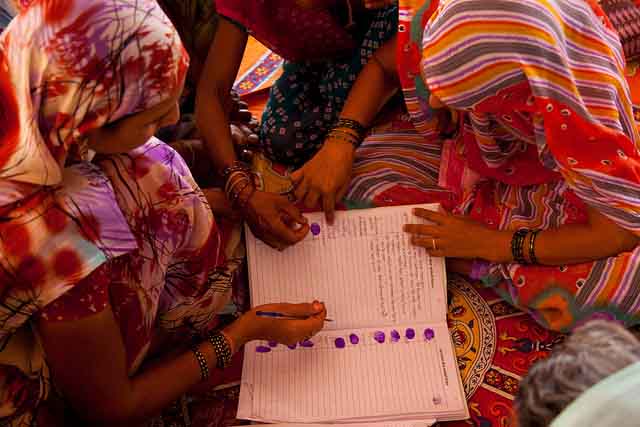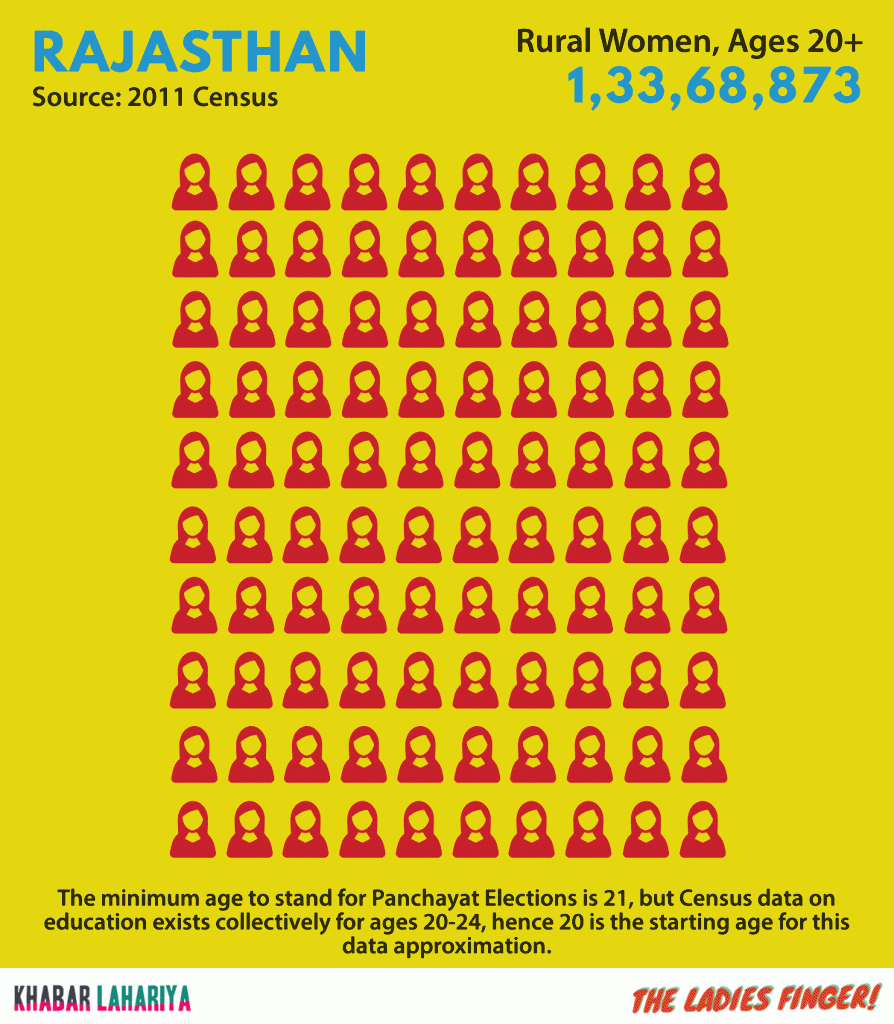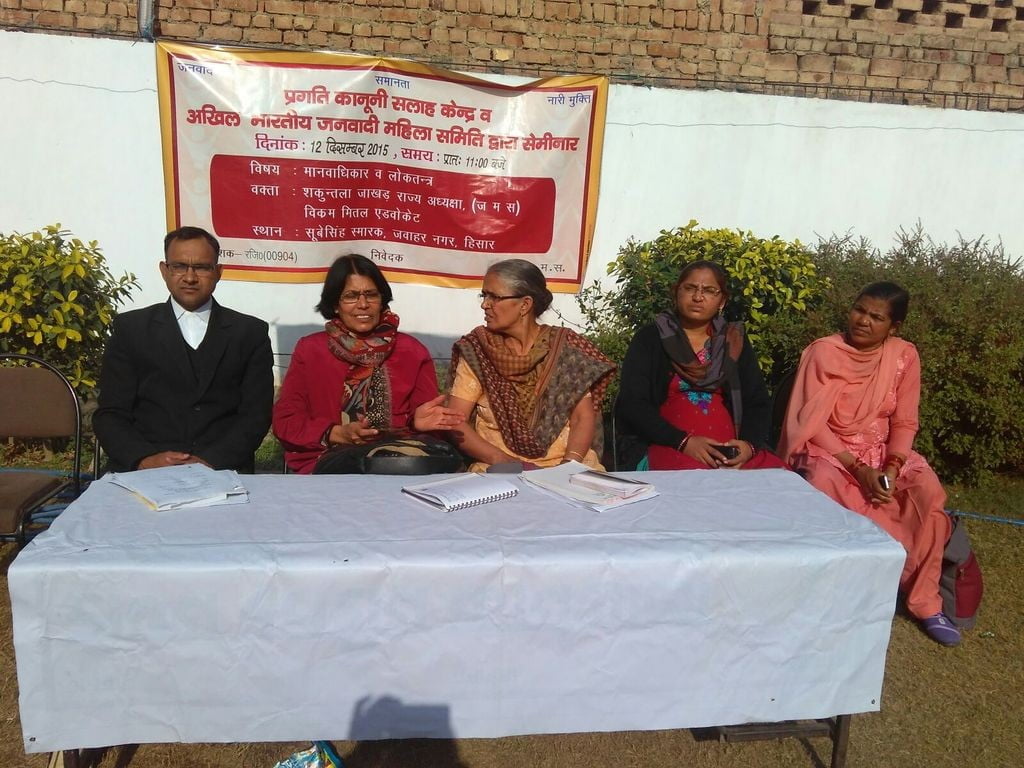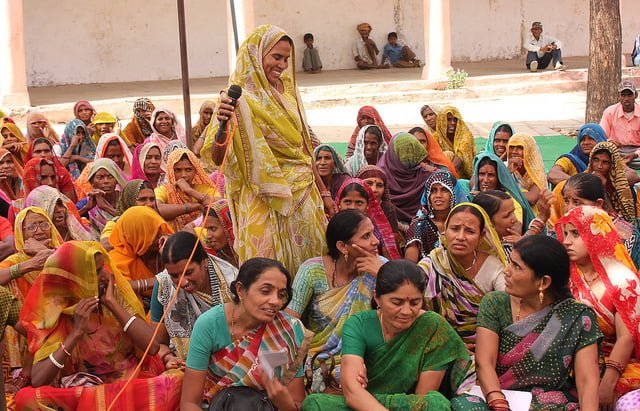Are Haryana’s new electoral restrictions, upheld by the Supreme Court, the beginning of the end for rural women’s enfranchisement in India? Will other states follow in applying absurdly elitist restrictions on election candidates? And when such candidates don’t exist, will people be forced to cheat the system in order to fix it?
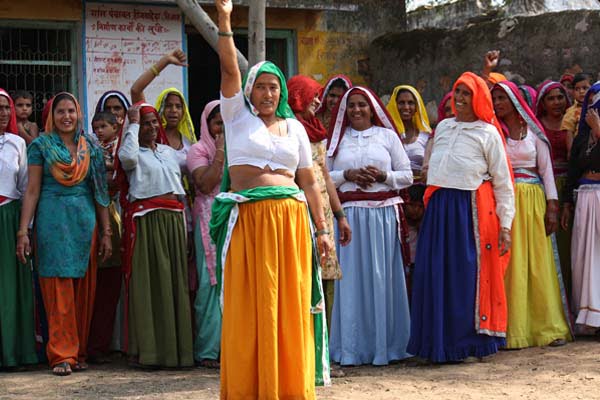
Rajkala Devi, the first woman Sarpanch of Hingwahera Gram Panchayat in Rajasthan’s Alwar District (UN Women Asia & The Pacific CC BY-NC-ND 2.0).
“I planned to run for elections for a third time,” says Kamlesh on the phone from Kaimari village in Hisar, Haryana. In 2004 she ran for and lost the post of sarpanch, and in 2009 she ran for block samiti elections and was defeated again. “I was defeated the second time by only 11 votes,” says the 45-year-old Dalit woman, who adds that her family has supported her work for the community.
She sounds proud when she talks of how she has made a difference to her village by focusing on development issues such as schools, rations and MNREGA. She talks about working for years for the better treatment of labourers in her community, for the rightful sharing of graveyards. Her tone only shifts to dejection and indignation when she turns to the question at hand – yes, it is true, she won’t be able to contest elections anymore.
There are villages in Haryana where there will now be not even a single eligible panchayat candidate under the new conditions. On December 10, the Supreme Court surprised most watchers by upholding the Haryana Panchayati Raj (Amendment) Act.
Haryana’s citizens now need to satisfy five conditions to stand for panchayat elections:
- Minimum schooling.
- The possession of a functional toilet in your house.
- Payment of all pending electricity bills.
- Payment of all outstanding debt to cooperative banks
- No criminal cases against them
With the exception of the last one on the list, none of these conditions have been imposed on any other public office in the state – only to the village bodies.
There’s going to be a further twist of the knife in villages like Neemkheda – all members of its current all-woman panchayat are now disqualified to run for office again. “I didn’t eat for three days when I heard about the SC verdict. Tell me what my fault is,” sarpanch Ashubi told Outlook magazine. “We need seven eligible women. If the panchayat fills up with men again, it’ll be very sad. Shall we let that happen or import women from Bihar and Rajasthan?
If it could happen in Haryana, can it happen elsewhere?
Unfortunately, it already has. On March 27, 2015 the Rajasthan Panchayati Raj (Amendment) Bill was passed – to now run for the post of sarpanch, all candidates are required to have functional toilets and have passed minimum Class 8, except in tribal reserved areas where they’ll need to have passed minimum Class 5. Those running for Zilla Parishad or Panchayat Samiti elections also have to pass minimum Class 10.
So a better question would be: If it could happen in Haryana, can it happen everywhere?
Neighbouring Rajasthan was and remains the only other state in the country to have enforced similar educational qualifications for panchayat elections. It’s led to a widespread fake certificates racket there.
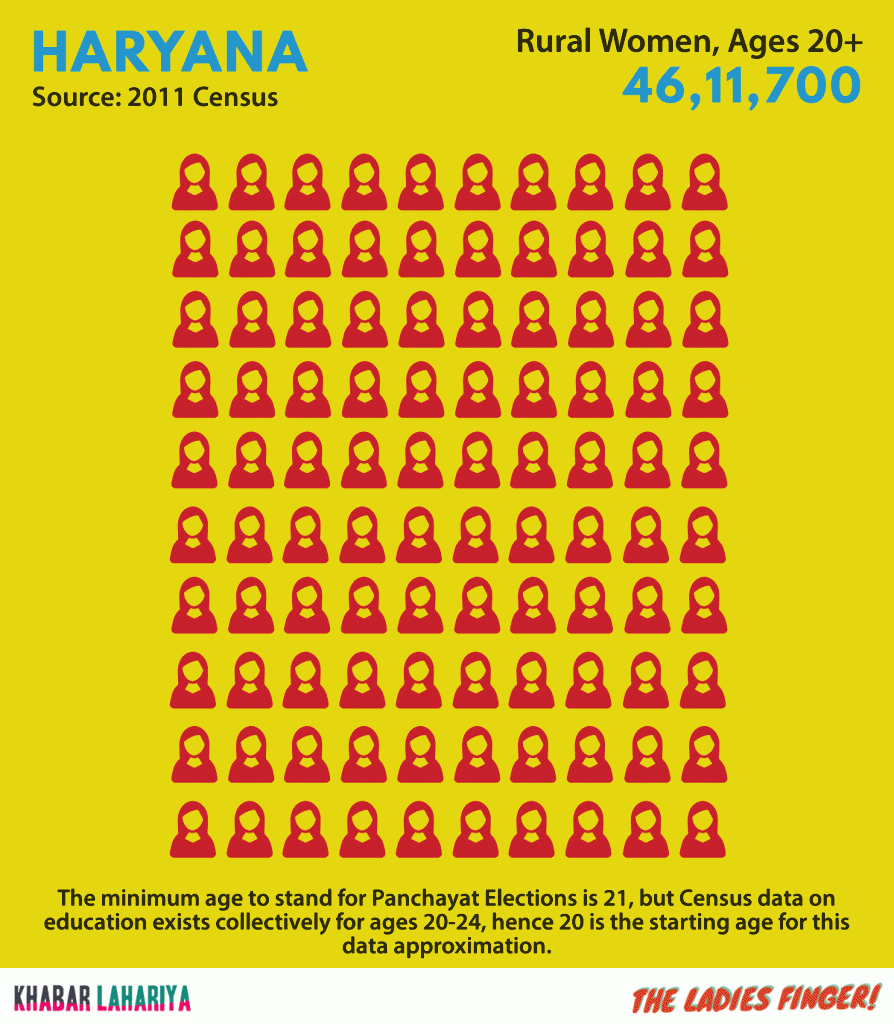 There are villages in Haryana where there will now be not even a single eligible panchayat candidate under the new conditions. There’s going to be a further twist of the knife in villages like Neemkheda – all members of it’s current all-woman panchayat are now disqualified to run for office again. “I didn’t eat for three days when I heard about the SC verdict. Tell me what my fault is,” sarpanch Ashubi told Outlook magazine. “We need seven eligible women. If the panchayat fills up with men again, it’ll be very sad. Shall we let that happen or import women from Bihar and Rajasthan?”
There are villages in Haryana where there will now be not even a single eligible panchayat candidate under the new conditions. There’s going to be a further twist of the knife in villages like Neemkheda – all members of it’s current all-woman panchayat are now disqualified to run for office again. “I didn’t eat for three days when I heard about the SC verdict. Tell me what my fault is,” sarpanch Ashubi told Outlook magazine. “We need seven eligible women. If the panchayat fills up with men again, it’ll be very sad. Shall we let that happen or import women from Bihar and Rajasthan?”
It’s worrying that Rajasthan should have been the first state to introduce a minimum education qualification for panchayat candidates. Only 66.1 percent of Rajasthan is literate, which means that 66.1 percent of people over the age of 7, according to Census enumerators, were said to have completed some level of schooling. The only states withlower rates than that are Arunachal Pradesh and Bihar. Data with the Office of the Registrar General also shows that Rajasthan had the largest literacy gender gap in 2011.
For women from Scheduled Caste and Scheduled Tribe communities, the numbers are starker. Census data shows that in Rajasthan,only 8.13 percent women from Scheduled Caste communities and 4.86 percent women from Scheduled Tribe communities are over 20 and have passed Class 5(21 is the cut-off age to stand for panchayat elections, but Census data is available only as a chunk for ages 20-24).
In Haryana, only 14 percent of rural women from Scheduled Castes are over 20 and have primary education (there is no data on women from Scheduled Tribes.)
No neat data exists to tell us how the Supreme Court’s ruling might affect panchayat elections in Haryana. But there is one crucial clue from Rajasthan. In the Rajasthan panchayat elections held this year, as ground reports show, several posts were left vacant, and many candidates were elected unopposed.
Where seats are reserved for candidates according to gender, caste or both, the absence of a suitably qualified candidate from that category means that that seat must remain empty. In the 2015 panchayat elections, 260 (2.63 percent of total elected sarpanches) were elected unopposed.
In Rajasthan in 2015, 43 percent of panchayat members were elected unopposed – a staggering number, even though corresponding data for 2010 is unavailable. Nearly half of the people who won panchayat seats hadn’t “contested” at all. They were put on a shiny escalator to victory.
Now, it’s good to note that the only other developing country that currently has such minimum education requirements for elected representatives at all levels is Indonesia. It’s also useful to remember that as of2011, Indonesia had an adult literacy rate of 93 percent.
Brazil too once had literacy tests for voters – at a time when 80 percent of the country was illiterate. In the 1980s, these laws were vehemently struck down.
“Is there nothing an uneducated person can do?”
On December 20 a group of angry women gathered in Mahua, Uttar Pradesh to be sworn in as new panchayat pradhans. They had just won the latest elections held the previous month, but they had other things on their mind.
Following the oath-taking, three pradhans – Shailkumari (Barsada Bujurg panchayat) Shyamkali (Baheri) and Pyari (Nauhai) – participated in a formal discussion organized by Khabar Lahariya. They were dressed festively and were quite cheerful about their first public discussion.
A brief scuffle ensued when Pyari’s husband – continuously reminding anyone who would listen that he was the literate one in the family and indignant that his wife was being interviewed instead – claimed, “Woh kya batayegi? Mujhse baat karlijiye! (What can she tell you? You should speak to me!)” He had to be physically moved out of the frame of the video camera twice by the reporters.
Neither Pyari nor Shyamkali have ever been to school. Shailkumari, who’s been elected pradhan for the second time, has passed Class 5. She heard about the Haryana ruling and has been simmering with rage since. She hit the ground running by saying, “Unpadh ke liye koi kaam hi nahi hai?(Is there nothing at all that an uneducated person can do?)”
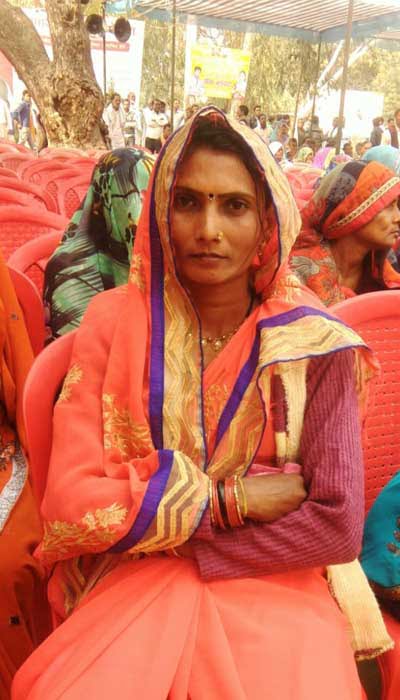 Shailkumari was the only one who sat down for the discussion without asking anyone for permission. She has strong views and is dismissive of the insinuation that she, practically non-literate, has a lesser ability than literate candidates to govern and do public work.
Shailkumari was the only one who sat down for the discussion without asking anyone for permission. She has strong views and is dismissive of the insinuation that she, practically non-literate, has a lesser ability than literate candidates to govern and do public work.
So what about the Supreme Court judgment that stated:“It is only education which gives a human being the power to discriminate between right and wrong, good and bad”?
The pradhans made the reasonable point that educational qualifications in rural schools don’t actually indicate the reality about one’s “literacy”, and that anyway literacy does not necessarily determine someone’s judgment.
All these pradhans are also Dalit, and have an understanding of how many formal restrictions and caste-based oppression have kept them out of both educational and political opportunities for centuries. The new Haryana and Rajasthan laws seem to be just more of the same – new iterations of the old caste-based discrimination and disenfranchisement.
They also point out that the government should be making an effort to create greater access to education and greater political opportunities for those who have had less access to education — and not make it worse for such citizens.
In an earlier interview with Khabar Lahariya, Shailkumari had said that she was elected again because she had done actual good work. “I got people’s homes made, toilets in their houses. Roads and sewage. It’s important to be educated, but of course people who haven’t been educated can see what’s going on [around them] – what work is happening, what isn’t. What needs to be done. Even the uneducated should have access to rights, to whatever the State offers. Don’t they have the right to speak, to observe, to say what’s right and wrong, to point out what needs to happen?”
In the body language of the pradhans, both in the assertive, unfussy Shailkumari, or even the more giggly and demure Shyamkali, no one can miss one thing: their having been elected, and sitting where they were and being asked their opinion, was a huge affirmation of their rights and citizenship. The implication that this hard won right, or access to power and political expression could be snatched away by the State whose responsibility it was to open up these spaces – as it has been in their neighbouring states – was infuriating and unacceptable.
“Hamare liye sab barabar hain. Aur janta ne humko jitaya hai, to hum bhi sabh padhe-likhe logon ke barabar hain. (For us, everyone is equal. And the public has made us win, so we’re also equal to those who are educated.)”
What’s the Problem Anyway?
“This whole issue has been fought in an undemocratic way,” claims Jagmati Sangwan, women’s rights activist and general secretary at All-India Democratic Women’s Association (AIDWA), which took the Haryana case to the Supreme Court. “It was passed as an amendment to the Haryana Panchayati Raj Act in Haryana as the last agenda item of the day – passed without debate and signed.”
The very next morning after passing the amendment, the Haryana Election Commission announced that panchayat elections would be held in January 2016, says Vikram Mittal, who helped AIDWA challenge the amendment along with Supreme Court lawyer Kirti Singh.
“It was completely against the democratic process, which is why we appealed to the Supreme Court. They listened to the issues seriously but unfortunately gave this judgment,” says Sangwan.“The deprived sections of our community hope to come into the mainstream, but this judgment only pushes them further into exclusion and marginalization.”
Human rights lawyer and former Additional Solicitor General Indira Jaising, who is representing the People’s Union for Civil Liberties (PUCL) in their challenge to the Rajasthan amendment in the Supreme Court, has also been vocal about her dismay at the court’s ruling in the Haryana case, which came rather unexpectedly. “At the hearing, which was very interactive, the court was presented with statistics on poverty, homelessness, and ownership of toilets,” she says on the phone from Delhi. “The judges were appreciative of the statistics on exclusion. Personally, I was expecting the law to be struck down.”
“Rajasthan does have a much lower literacy rate than Haryana. But considering the judges were already accepting of the fact that over 50 percent of people in Haryana would be excluded [by such a judgement], I do not think the outcome will be different for Rajasthan,” says Jaising. She believes that the new ruling leaves a window open for other states to now impose similar restrictions.
According to 2014 figures with ASER Centre, an organisation that assesses the outcomes of social sector programmes, only 53.9 percent of children in Class 5 in rural Haryana government schools could read a Class 2 textbook. In Rajasthan, the corresponding figure was 34.4 percent. Perhaps it’s time to focus on our broken school system before trusting in its ability to train our community leaders?
Is there an Exit Sign?
Is there no way out for the lakhs of people in Haryana and Rajasthan disempowered by the barriers to standing for panchayat elections?Can the Supreme Court’s or the state governments’ decisions ever be reversed?
“Legally there is very little recourse,” says Alok Prasanna Kumar, Senior Resident Fellow at the Vidhi Centre for Legal Policy, a Delhi-based legal think tank. “The two avenues are review petitions and curative petitions. Review petitions are in the vast majority shot down. Since 2002, when the curative petition system was put in place no more than two or three have succeeded.”
“There are two other ways in which this ruling can get challenged,” Kumar adds. “One is that a similar law (such as the one in Rajasthan) might come up in front of a completely different SC bench and get challenged. Then it gives openings for the court to revisit this ruling. Otherwise, and this is not an ideal route, if other states take heart from this ruling and come up with more and more exclusionary laws and if the court is then confronted with something so patently absurd that it has no way of ignoring it, then this [Haryana] ruling could get revisited too.”
AIDWA is wasting no time. They’re filing a review petition today on December 23. It’s also launched an online petition to gather signatures to submit to the Chief Justice of India and the President of India.
Besides legal methods, Haryana could also go the legislative route to remedy the situation. It has a precedent for having revoked its own law, such as the one on its two-child policy, Jaising points out.
She isn’t keeping her fingers crossed, though.
* * *
Just a few days after the SC ruling, the Haryana Advocate General’s office has submitted further suggestions to the State Cabinet for a law that would make Class 12 a cut-off condition to stand for municipal elections. If the Chief Minister approves it, an ordinance to the effect will be promulgated.
“We’re all very wretched about the new Supreme Court ruling,” says Kamlesh, the panchayat poll aspirant from Haryana who was preparing to contest for her panchayat a third time. , This is something she repeats several times in an otherwise matter-of-fact conversation. “In the whole zila and wider area, there are so many women who will not be able to run – all these women who showed so much strength…”
But she has no intention of giving up easily. “Even if these conditions are still there in the next election, we’ll continue to work outside power. We have to do the work,” she says. “We have to speak up for our community.”
This story is a collaboration with The Ladies Finger and with additional inputs from Gender in Politics.
